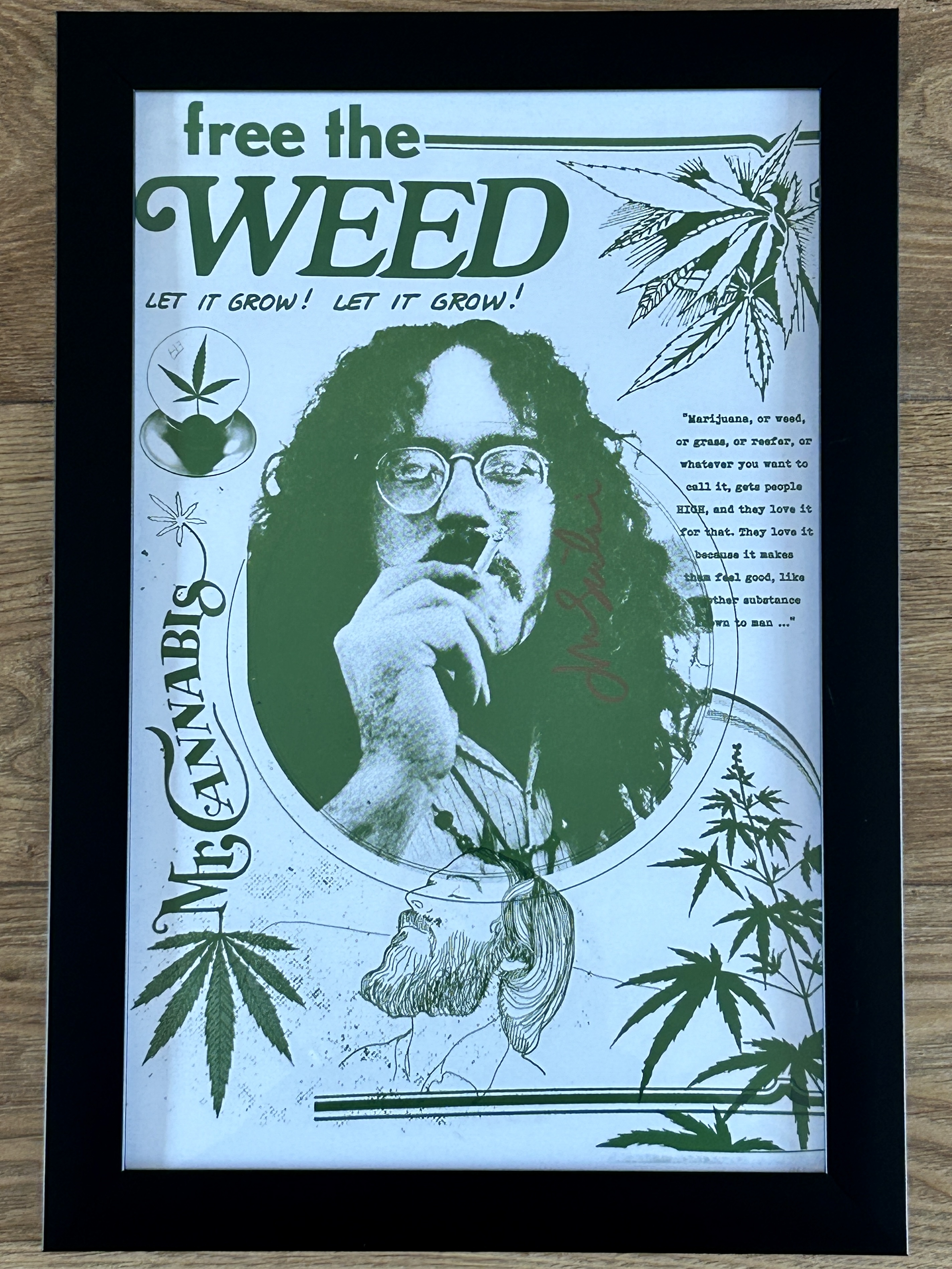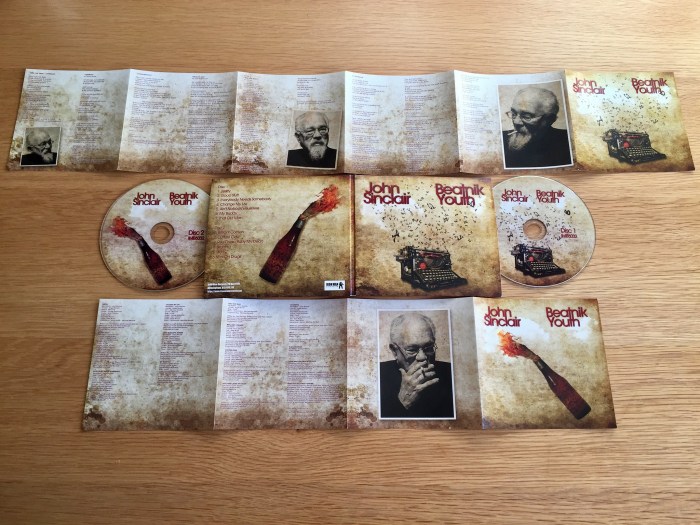Immortalized by John Lennon’s 1972 song that bears his name, Sinclair is an iconic figure of ‘60s counterculture, famous for, among other things, having co-founded the anti-racist White Panther Party and for managing Detroit’s legendary proto-punk outfit MC5 early in its history. Following a highly publicized two-year stint in prison for marijuana possession (Lennon’s song was a protest against his incarceration), Sinclair has stuck to his guns as an advocate for marijuana reform.
“Living Euro to Euro, sleeping on the couches and extra beds of friends, a man without a country and a post office box in New Orleans for a permanent address.” That’s how spoken word poet John Sinclair describes himself on Beatnik Youth. From raucous rock ‘n’ roll to psychedelic jazz and abstract soundscapes. Throughout, John Sinclair’s booming voice functions as an anchor, taking on an American social landscape bursting with civil unrest and self-reinvention as Youth’s modernist production swirls around him.
John Sinclair – “Beatnik Youth” on Double CD
Disc 1
- Testify (9.10)
- Good Stuff (4.32)
- Everybody Needs Somebody (7.09)
- Change My Life (5.14)
- Ain’t Nobody’s Business (3.36)
- My Buddy (5.13)
- That Old Man (3.53)
Disc 2
- Brilliant Corners (11.29)
- Culture Cide (11.38)
- Red Dress (Ruby My Dear) (6.25)
- Sitarrtha (6.16)
- Do It (6.16)
- War On Drugs (6.18)
Read a brilliant review of Beatnik Youth by Gus Ironside for Louder Than War here
‘Beatnik Youth’ is arguably the pinnacle of Sinclair’s many releases; Sinclair and Youth have succeeded in drawing the connections between music, counter-culture and political activism of the 1960s with the broiling turmoil of the present day.
This is an album that draws on the past to provide reflection, inspiration and hope for the future.
Manager of the MC5, co-founder of the revolutionary socialist White Panther Party (set up in solidarity with the Black Panther Party) and a life-long political/cultural activist, John Sinclair has been celebrated by counter-culture icons as diverse as John Lennon, Henry Rollins and Julian Cope.
Quickly becoming a thorn in the side of the authorities, Sinclair was jailed for ten years for giving two marijuana joints to an undercover cop. A massive ‘Free John Sinclair’ rally and concert was organised, featuring John Lennon and Yoko Ono as headliners, with Lennon penning a protest song ‘John Sinclair’ to focus attention on Sinclair’s plight.
Saby Reyes-Kulkarni interviewed John Sinclair and Youth and wrote a fantastic piece for Bandcamp here
John Sinclair, the renegade poet, scholar and cultural revolutionary released “Beatnik Youth” on Iron Man Records. The double CD contains over 80 minutes of music from the restless creative mind of Youth, with some fine spoken word and poetry delivered by John Sinclair.
John, has been described as an Archetype of the 1960’s art, music and literary synthesis, and who today continues his work for cultural transformation.
Youth is one of the UK’s most influential producers and has been honoured, with an Outstanding Contribution Award by the Music Producers Guild. His career spans more than 30 years and is one of the UK’s most consistent, credible and influential producers.
You can order John Sinclair Vinyl, CDs and T-shirts here: https://ironmanrecords.net/store/
Also by John Sinclair
From Detroit to New Orleans and from Los Angeles to Amsterdam, John Sinclair is still the king-size, psychedelic old-gangster poet, a living legend, a veteran of the counterculture, a survivor of the Marijuana Wars, and one of the last bohemians still standing. As a co-founder of the Detroit underground newspaper The Fifth Estate, manager of MC5, and Chairman of the White Panther Party described on Wikipedia in these modern times as a far-left, anti-racist, white American political collective founded in 1968 and dedicated to cultural revolution his mark on the boho rock & roll underground has been unique.
In 1969, with Richard Nixon in the White House, Vietnam in chaos in the wake of the Viet Congs near-suicidal Tet Offensive, and American cities still scared and scarred from urban riots, even the comparatively harmless agitprop pranks of White Panther cultural revolution had those in power reaching for their metaphoric and sometimes actual revolvers. Authorities remembered how John had organized the MC5 playing outside the 1968 Democratic National Convention in Chicago, the only band actually able to perform before Mayor Daley’s rabid police department violently derailed the massive anti-Vietnam war rally with teargas, billy clubs, and helicopter support.
John was deemed a danger to society and set up like a bowling pin. After handing a couple of joints to a hassling hippie who turned out to be an undercover narcotics agent, John found himself on the bad end of a ten year jail term. At the same time though he became a cause celebre. Free John Sinclair became one more battle cry in an embattled era. Protests, propaganda, and a giant concert in Ann Arbor headlined by John Lennon and Yoko Ono ultimately resulted in John’s release in November 1971. Lennon even wrote a song about him called ‘John Sinclair’ which he included on his ‘Sometime In New York City’ album.
In common with much that happens with John, a meeting with producer Youth (Paul McCartneys ‘Fireman’, Primal Scream, The Verve etc & Killing Joke bass player) that sowed the creative seeds was a matter of stoned synchronicity. As former Track Records boss Ian Grant tells it, Alan Clayton told me he had John Sinclair coming round tomorrow. I said “The John Sinclair?” One night Zodiac (Mindwarp) was on the bill with the Dirty Strangers and Youth was very taken with John. “I want to make a jazz album with John” he said. Since then, the two met at Youths house whenever he was home, and when John was in the country, and recorded the album.
And through the course of those recordings John, always so associated with the 1960s, took a serious step into the ways of the 21st century, with the same intoned poetry, but with melodic backing vocals, highly inventive production, even a nod to hip-hop, but still remembering his first loves of blues, be-bop, and classic rock & roll.
Beatnik Youth is one more step in the Big Chief’s long zig-zag trip that seems set to continue all the way to the far blue horizon. Summing up John Sinclair, you can only say with certainty that the beatnik goes on.
John Sinclair – Founder and chairman of the radical anti-war group, The White Panther Party, an offshoot of the Black Panthers.
WHITE PANTHER: The Legacy of John Sinclair – a short film by CHARLES SHAW featuring JOHN SINCLAIR music by THELONIUS MONK
John Sinclair is best known as the Sixties “marijuana” activist who was sentenced to 10 years in prison for giving two joints to an undercover policewoman. he was eventually freed when John Lennon and Yoko Ono spoke out on his behalf. Less understood is his role as the founder and chairman of the radical anti-war group, The White Panther Party, an offshoot of the Black Panthers. The Black Panther Party was a militant political organization formed after the brutal murders of Martin Luther King, Malcolm X and Robert Kennedy.
The Nixon Administration and the FBI launched a secret program called COINTELPRO to disrupt and ultimately destroy the Black Panthers and the Anti-War movement. As part of this program, John Sinclair was set up and imprisoned on marijuana charges. When the government could no longer justify denying him a bond over two joints, they falsely charged him with a Federal conspiracy to blow up a CIA station, in order to make him disappear.
Youth
Youth has been responsible for numerous hits from artists including The Verve, Embrace, Echo and the Bunnymen, Crowded House, The Orb, Sir Paul McCartney and The Charlatans. Among his recent projects was the co-production of Pink Floyd‘s final and largely instrumental album, The Endless River. Youth also remixed David Gilmour‘s current solo album, Rattle That Lock. The Verve’s Urban Hymns brought Youth a BRIT Award for Producer of the Year after three consecutive years of nomination.
Youth says “I’m very proud of the longevity of work on Killing Joke and The Orb, how those recordings still sound fresh… and what I’ve done with The Verve and Richard Ashcroft, and Paul McCartney (The Fireman) and Pink Floyd. It’s only really working with those guys, with my insecurities, that I felt as though I could go, ‘yeah, I am a producer’.” His “university” was Killing Joke after he left school, and it “doesn’t really get more intense than that”.
As a young musician Youth, whose real name is Martin Glover, cut his teeth doing bass sessions for Adrian Sherwood productions and for artists such as Kate Bush whose phenomenally successful Hounds of Love album had Youth on bass. He was also a founder member and bassist of the band Killing Joke. After leaving Killing Joke (and a short experiment with the band Brilliant, managed by Bill Drummond and featuring June Montana, Jimmy Cauty and other key innovators of electronic and indie dance music), Youth began working with Alex Paterson and Cauty as The Orb, a collaboration that was responsible for the introduction of chill-out ambient house music.
Cauty and Drummond eventually moved on to form The KLF, leaving Youth and Paterson to experiment extensively in the post punk British dance music and Acid House scene. This led to the release of two classic albums as The Orb – U.F.Orb and Adventures Beyond The Ultraworld, which incorporated Little Fluffy Clouds, a track that defined ambient house and chill-out and brought these genres firmly into the mainstream.
Youth’s skills as a producer were now being noticed by a much wider audience, not least because of his remix work with band like Siouxsie and The Banshees, Malcolm Maclaren, A Guy Called Gerald, Fine Young Cannibals, Marc Almond and U2. In 1993, he collaborated with Sir Paul McCartney who had developed an interest in remix culture. This resulted in Strawberries Oceans Ships Forest, an ambient album – and the first of three critically acclaimed albums – released under the name of The Fireman.
Over the years, Youth has notched up a staggeringly large and varied list of production and remix credits for artists such as Yazz, James, Primal Scream, Gun’s N’ Roses, Blue Pearl, Art of Noise, P.M. Dawn, Shack, De La Soul, Erasure, Beth Orton, Bananarama, Maria McKee, Suns of Arqa, The Shamen, Kool and the Gang, Texas, Pete Murphy, Tom Jones and Dido. He remains tireless in his quest for inspiration, excellence and innovation in recording great music and also finds time to paint, illustrate and publish poetry.
John Sinclair
John Sinclair the White Panther firebrand who stoked the MC5’s insurrectionary manifesto has roots that stretch back to jazz and the beats, as a writer, avant-garde champion and poet. John has travelled the world, collaborating with like-minded souls; a living embodiment of the original free spirit that fought to emancipate a generation, one of the few still flying the freak flag.
Since the early 90s, Sinclair has released albums of his poetry, but Beatnik Youth is possibly some of John Sinclair’s best work to date.
This poorly served generation needs it: that militant energy which released the bats in the 60s is crucially booted into the 21st Century in a riotous celebration of personal freedom, cultural trailblazers and marijuana.
Iron Man Records Patrons made this release possible:
Become a Patron and help make more things happen https://www.patreon.com/ironmanrecords
Discover more from Iron Man Records
Subscribe to get the latest posts sent to your email.







